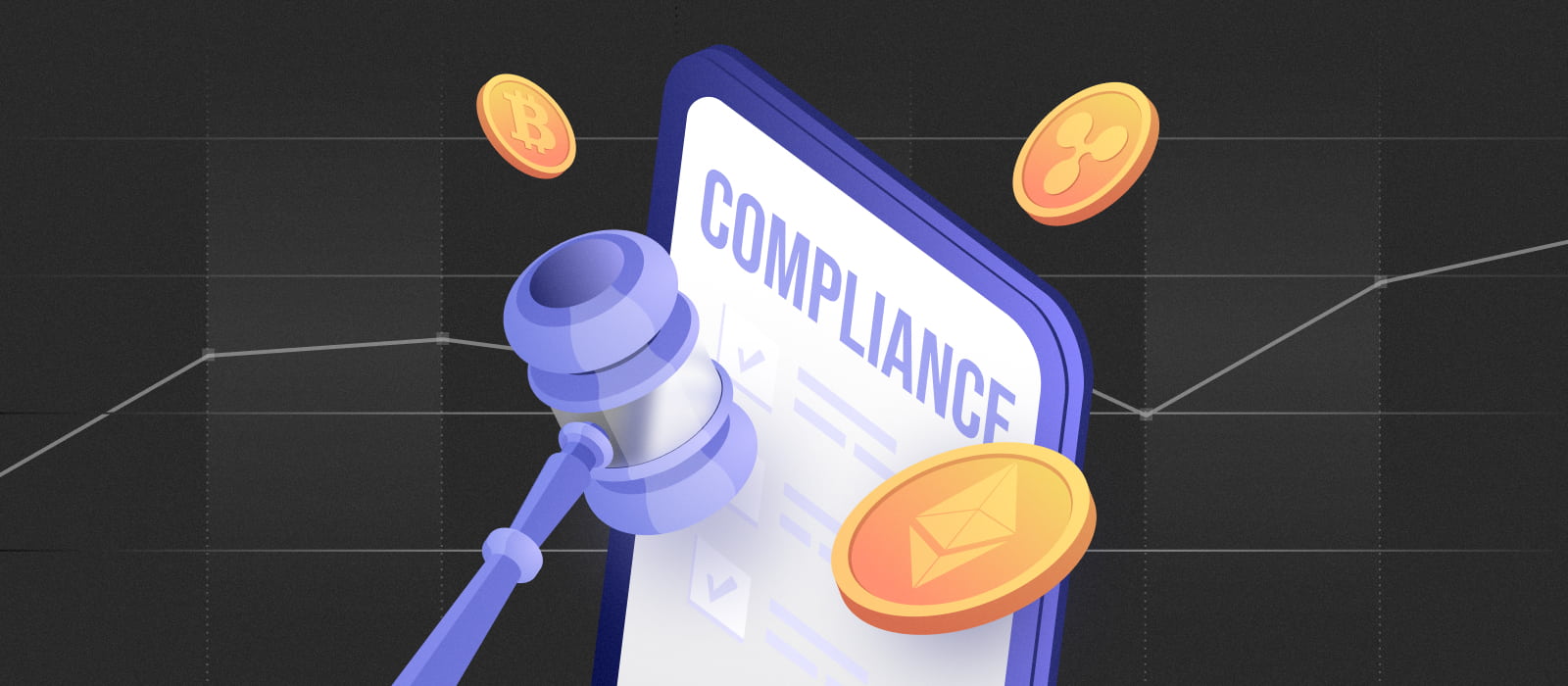Crypto regulations are being strengthened, leading to severe penalties and legal challenges for some prominent players in the industry. So, how can you keep your solutions compliant?
Despite the popular belief that the crypto and blockchain sector operates outside the realm of compliance regulations, the truth is markedly different. As this industry grows and matures, governments and regulatory authorities are aiming to subject crypto activities to more stringent oversight and regulation.
The primary goal is to protect consumers, prevent illegal activities, and maintain financial stability, acknowledging the significant role that cryptocurrencies now play in the economy.
In this article, we will examine cases of non-compliance, understand the mistakes made, and provide insights to help you avoid them. Furthermore, we’ll explore the common blockchain regulations and crypto compliance requirements, ensuring you’re well-informed about what’s needed to fulfill your obligations.
Overview of crypto non-compliance cases
Recently, the blockchain community witnessed several cases of big crypto companies facing allegations of regulatory breaches.
Let’s take a closer look at each case.
Binance
In November 2023, Changpeng Zhao, co-founder and CEO of Binance, faced conviction for neglecting to establish adequate Anti-Money Laundering measures, operating an unlicensed money transmission business, and violating sanctions.
In particular, the US Treasury Department claims that “Binance failed to report to FinCEN transactions associated with terrorist groups including Al Qaeda, the Islamic State of Iraq and Syria (ISIS), Hamas’ Al-Qassam Brigades, and Palestinian Islamic Jihad (PIJ).”
The Office of Public Affairs’ statement provides additional insights into the accusations:
“Binance also did not implement the core components of an effective AML program: Binance did not implement comprehensive Know Your-Customer (KYC) protocols or systematically monitor transactions, and Binance never filed a suspicious activity report (SAR) with FinCEN.
For years, Binance allowed users to open accounts and trade without submitting any identifying information beyond an email address. Binance began requiring all users to provide KYC information in August 2021 but allowed users who had not provided KYC to continue trading on the exchange until May 2022.”
The consequences of the lawsuit have been devastating. First, as Zhao pleaded guilty, he had to resign from his CEO position. Second, Binance had to pay a $3.4 billion penalty to the Financial Crimes Enforcement Network (FinCEN) and $968 million to the Office of Foreign Assets Control (OFAC).
Additionally, regulatory authorities will have access to Binance’s financial records and documentation for oversight for a three-year monitoring period.
The State of Crypto Regulations and Laws in 2026
Walkthrough Overview of Security Token Offerings
Kraken
The Kraken crypto exchange faced a lawsuit from the U.S. Securities and Exchange Commission. In its civil complaint, the SEC states:
“Without registering with the SEC in any capacity, Kraken has simultaneously acted as a broker, dealer, exchange, and clearing agency with respect to these crypto asset securities. In doing so, Kraken has created risk for investors and taken in billions of dollars in fees and trading revenue from investors without adhering to or even recognizing the requirements of the U.S. securities laws that are designed to protect investors.”
Moreover, Kraken was accused of mixing the project’s funds with those of its customers, using bank accounts holding users’ cash to pay for its operational expenses.
However, Kraken denied the accusations and expressed its position on Twitter:
“We disagree with the SEC’s complaint against Kraken, stand firm in our view that we do not list securities and plan to vigorously defend our position.”
Bittrex
Bittrex is another crypto exchange accused by the SEC of operating as a securities exchange, broker, and clearing house without registering with the regulator.
The SEC’s civil complaint claims:
“The Bittrex Platform, like other crypto asset trading platforms, has merged three functions that are typically separated in traditional securities markets — those of broker-dealers, exchanges, and clearing agencies — despite the fact that Bittrex has never registered with the SEC as a broker-dealer, national securities exchange, or clearing agency. All the while, Bittrex earned at least $1.3 billion in revenues from, among other things, transaction fees from investors (including U.S. investors) it has placed at significant risk while servicing them in these unregistered capacities.”
Bittrex neither admitted nor denied the allegations. However, the outcome for the project is catastrophic: a $24 million fine and the platform’s shutdown. All transactions on Bittrex will be suspended on December 4, 2023.
What crypto regulatory requirements are there?
![]()
To avoid finding themselves in such unfortunate situations, crypto projects should be well-versed in and compliant with regulatory requirements. These regulations can differ based on the region and the specific type of crypto activity, but there are some standard rules and obligations to keep in mind:
Know-Your-Customer
Know-Your-Customer is a crucial compliance process in the crypto industry designed to verify the identities of individuals or entities engaging in financial transactions. This way, platforms can ensure that their services are not being used for criminal purposes.
To sign up on dApps, such as exchanges or DAOs, users are required to provide identification documents. This may include a government-issued ID, driver’s license, or other forms of identity verification. Some platforms also ask for specific personal information such as full name, date of birth, address, and even a photograph or selfie for facial recognition.
KYC is often a legal requirement imposed by governments and regulatory authorities. Failure to comply with KYC regulations can lead to penalties and the termination of businesses.
Blockchain and KYC: Expert Interview on Navigating Security and Compliance Challenges
Know-Your-Transaction
While KYC focuses on verifying the identity of individuals engaging in crypto transactions, Know-Your-Transaction (KYT) monitors and analyzes the transactions themselves.
KYT tools delve into the details of smart contracts, wallets, and assets to detect potential risks. By leveraging advanced analytics and data intelligence, KYT solutions can flag suspicious activities, unusual transaction behaviors, and entities that might pose a risk.
This comprehensive approach helps ensure compliance with regulatory standards and safeguards businesses from engaging in potentially harmful or illegal operations.
Know Your Transaction (KYT) Explained: Understanding its Role in Financial Compliance
Find out the most common smart contract vulnerabilities and ways to prevent them
Anti-money laundering
Anti-money laundering (AML) measures are designed to prevent and detect the process of making illegally gained proceeds seem legal. AML is especially important in crypto since financial transactions on the blockchain are decentralized and often anonymous.
To comply with AML regulations, crypto projects are required to continuously monitor users’ transactions and report high-value transactions and suspicious activities to regulatory authorities.
Machine Learning in Anti-Money Laundering: Benefits, Limitations, and Applications
Fraud Detection Using Machine Learning: Pros, Cons, and Use Cases
Counter-terrorism financing
Counter-terrorism financing (CTF) regulations are designed to prevent the use of cryptocurrencies and DeFi platforms for funding terrorist activities.
Crypto exchanges, wallet providers, and other entities operating with blockchain transactions are obligated to report any transactions that raise suspicion. These transactions often exhibit distinctive patterns, such as large-scale transfers of assets, swift movement of funds, or links to high-risk jurisdictions.
Besides, crypto projects must comply with international and national sanction lists, ensuring they do not facilitate transactions for individuals or entities associated with terrorism.
Securities regulations
If tokens traded on a crypto platform are classified as securities, they must comply with the relevant securities regulations.
This classification depends on various factors, including how the tokens are issued, their intended use, and the expectations set for investors. For instance, in the United States, the Howey Test is commonly used to determine if a token is a security.
Once the token is defined as a security, it must be registered with the appropriate regulatory body, such as the Securities and Exchange Commission (SEC) in the U.S. and comply with various reporting, transparency, and investor protection requirements.
Failure to comply with securities regulations can result in enforcement actions, including fines, legal battles, or even the shutdown of the platform.
Navigate security token offerings like a pro with our all-encompassing handbook
Achieving full regulatory compliance with KYT by PixelPlex
To assist crypto businesses and financial institutions with improving compliance and risk management, PixelPlex developed an efficient Know-Your-Transaction solution.
How does it work?
- Our KYT continuously monitors and thoroughly analyzes data and metadata associated with a wide range of crypto assets, wallets, transactions, contracts, and interactions on the Ethereum blockchain.
- The solution identifies anomalies and potential high-risk operations.
- The extracted insights are further transformed into dashboards and custom datasets, helping companies upgrade their market intelligence, research, and compliance.
PixelPlex’s KYT also allows companies to receive immediate alerts aligned with their AML compliance policies. This assists in identifying high-risk actors involved in activities such as fraud, wash trading, terrorism funding, darknet operations, scams, ransomware, and infringement of intellectual property and licensing rights.
What is the future of crypto regulations?
Based on the current trends of reinforcing crypto legislation and increased scrutiny from global financial regulators, it’s evident that the cryptocurrency industry is moving towards a more regulated and transparent future.
For instance, the European Union recently introduced the Markets in Crypto-Assets (MiCA) regulatory framework. Under this new system, all cryptocurrency projects must obtain a license and adhere to Anti-Money Laundering and Counter-Terrorism Financing standards to have the right to serve customers based in the EU.
With these new regulatory restrictions, companies in the cryptocurrency sector must adjust by developing strong compliance systems and keeping up-to-date with the changing regulatory environment. This adaptation is essential to maintain compliance and ensure the sustainability of their operations.
Need assistance with navigating the evolving crypto regulations and crypto compliance solutions? Get in touch with our experienced blockchain services company. We keep track of all the latest developments in cryptocurrency laws and guidelines as well as financial software development and are eager to provide you with valuable insights. Our team can also assist you with cryptocurrency exchange development services and other crypto related solutions.




